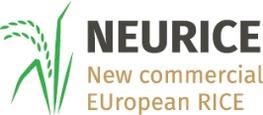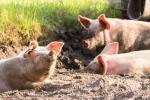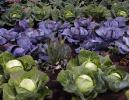
H2020 NEURICE project: New commercial European rice (Oryza sativa) harboring salt tolerance alleles to protect the rice sector against climate change and the invasion of the apple snail (Pomacea insularum).
- Type Project
- Status Filled
- Execution 2016 -2020
- Assigned Budget 4.608.975,00 €
- Scope Europeo
- Main source of financing Horizon 2020
- Project website NEURICE
During the first year of the project, various elite Spanish, French, and Italian rice strains were crossed with salinity-tolerant Asian lines. This winter, hundreds of seed strains selected for their salinity tolerance will be evaluated in hydroponics. The most successful strains will be tested in saline and non-saline fields during the 2018 and 2019 campaigns.
The NEURICE project has also begun monitoring the salinity of some salt fields in Spain, France, and Italy to test new salt-tolerant rice varieties currently under development. For several months, the salinity of the rice fields' water and soil, the height of the water surface, and the salinity of the water entering and leaving the fields will be closely monitored.
The new rice strains are expected to be ready for planting next season, allowing them to be evaluated in both saline and non-saline fields. In addition, parallel genome and proteome studies are being conducted on the most salinity-tolerant rice varieties from around the world to determine which mechanisms, genes, and alleles enable these plants to grow in highly saline environments.
Rice production in Europe, which currently accounts for two-thirds of the rice consumed on the continent, is threatened by the effects of climate change, as is the case with other crops. In the Mediterranean region, climate change is causing rising temperatures and more frequent and severe drought periods, which impair water quality and river flow. These effects increase soil salinity, negatively impacting crop productivity. Climate change is also causing sea level rise and further increases in salinity in coastal areas, deltas, and river mouths where rice is grown. As a result, it threatens the very existence of the rice sector in the Mediterranean region.
The NEURICE (New European Commercial Rice) project seeks to develop new salt-tolerant rice varieties. This will allow European rice varieties adapted to new conditions, allowing rice cultivation to continue without losing productivity and maintaining the positive environmental, landscape, and socioeconomic impact of this activity.
Furthermore, in Catalonia, the Ebro Delta has been threatened for several years by an invasive species with devastating effects on the rice harvest: the giant apple snail (Pomacea maculata). Its high reproductive capacity and the absence of natural predators have made it impossible to stop its spread in the Delta, causing increasing damage to crops. Flooding fields with seawater has been one of the few strategies that has successfully curbed the presence of the giant apple snail, taking advantage of its low tolerance to salinity. Unfortunately, the residual salinity after treatment with seawater causes crop losses that, in the worst cases, can affect up to 30% of production.
Therefore, the NEURICE project not only offers a solution for adapting rice varieties to climate change, but will also help combat the invasion of the apple snail in Europe.
Approximately two-thirds of the rice consumed by European citizens is produced in the EU, and its productivity is affected by abiotic and biotic stress. Of particular concern is the increase in global temperature over the last century, especially over the last 50 years (0.13°C/decade).
One consequence has been a clear trend toward salinization, affecting rice, one of the most salt-sensitive crops in the region. Associated with changes in temperature and salinity, the biotic stress of the apple snail of the genus Pomacea now threatens to destroy rice fields, devouring planted seeds and rice seedlings, representing one of the worst pests introduced to gastropod crops in recent times. This pest is currently estimated to cause damage to rice fields worldwide, with losses amounting to tens of billions of euros annually.
Apple snails have recently been detected in the Ebro River Delta (Spain), and now represent an important factor for wetland biodiversity and rice production in Europe. To date, measures taken to combat apple snails have been unsuccessful, but in the autumn of 2013, 2,500 ha of infested fields were flooded with seawater. This treatment proved 100% effective in destroying apple snail infestations; however, residual salt concentrations negatively affected rice productivity.
Therefore, the overall objective of the NEURICE project is to identify and introduce genetic variation into European rice varieties in order to obtain salinity-tolerant commercial varieties in order to (i) mitigate the impending effects of salinization and water quality deterioration in Mediterranean basins due to climate change, and (ii) avoid the production decline observed after seawater treatments performed on rice fields that successfully controlled the apple snail pest. The availability of salt-tolerant commercial rice lines will prevent abiotic stresses arising from climate change, while also preventing the spread of this devastating pest (biotic stress) throughout Europe.
The NEURICE project will produce new elite salinity-tolerant European rice varieties that will protect the rice sector from productivity losses caused by salinity levels resulting from climate change and from treating fields with seawater to curb apple snail infestation. Knowledge about the cultivation of these new varieties will be distributed to EU end-users, including the rice industry and the rice sector. In addition, management practices such as dry sowing and rational water use will be implemented. These management practices will be improved by comparing data from field trials with different salt concentrations and rice varieties with data from the implementation of a remote salinity monitoring system currently under development.
New elite salinity-tolerant European rice varieties will be developed through a novel breeding strategy that includes molecular marker-assisted breeding and embryo rescue in immature seeds. These new salt-tolerant improved varieties will conserve the natural environment of rice-growing regions and increase rice diversity for greater adaptability to specific environments, including tolerance to abiotic and biotic stresses to address a changing climate.
Interestingly, the spread of the apple snail across Europe may be halted or even eradicated thanks to the availability of these new European salt-tolerant varieties. Seawater treatments on infested fields (which proved 100% effective) can be resumed, thus avoiding less effective and highly polluting chemical strategies. Furthermore, dry sowing studies show that salt-tolerant varieties will be crucial to minimizing the effects of the apple snail, even without seawater treatments, as the snail remains dormant during the initial growth stages, when rice is vulnerable.
In the long term, the knowledge and tools created will support the productivity and stability of the agricultural sector in Europe and possibly beyond. Along with the development of new salt-tolerant varieties, IRIS will develop a wireless sensor network for salinity monitoring, which will alert rice farmers and cooperatives to increases in salinity so they can switch to growing the salt-tolerant varieties developed in the project.
The identification of loci and accessions with moderate salt stress tolerance in japonica using mapping methods, coupled with non-destructive phenotyping, will advance our understanding of salt tolerance in rice and, consequently, allow for the introduction of other alleles related to additive salt tolerance to further enhance rice salt tolerance in future rice breeding programs.
Furthermore, the NEURICE project will support the development of an innovative ecosystem in the EU agri-food sector and the development of the European Innovation Partnership for Productive and Sustainable Agriculture (EIP-AGRI).
- UNIVERSITAT DE BARCELONA (UB)
- Project website (CORDIS)
- News
- News
- News
- Video Soil Salinity at the Ebro Delta -IRTA
- Video Rice breeding at University of Barcelona
- Video Rice embryo rescue. Neurice.eu
- Video The NEURICE program provides six varieties of grapes tolerant to salinity
- Project documentation (reports, guides and articles)
- Project Account on Facebook







